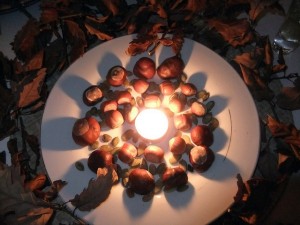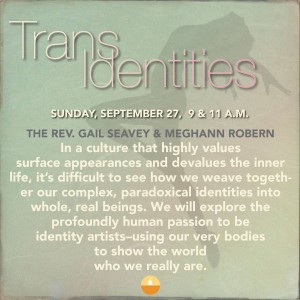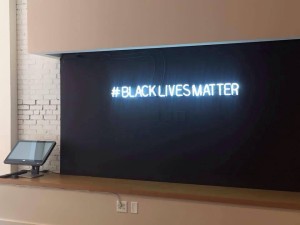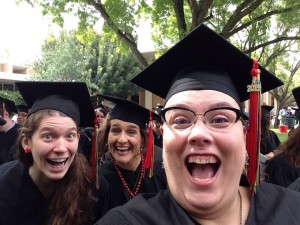This is the text of a sermon given at First Unitarian Universalist Church of Nashville on September 6th, 2015.
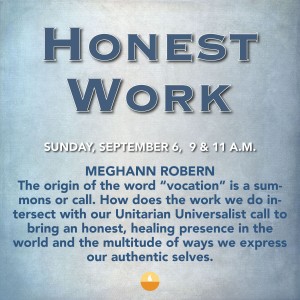

Listen to the sermon:
Honest Work
So I have this friend, Allison, we’ve been friends since 2nd grade. We’ve watched each other grow up. She found her calling as a jeweller, and she’s really good at it, and she amazes me with what she can do — it starts in her brain as an image, and then she takes that image and figures out what raw materials she needs to make it a reality, and then she uses her hands and eyes to craft the most beautiful things to put on our beautiful bodies. And that’s what I love about her work — she doesn’t just make things for their own sake, but in her vision she sees how they will interact with necks and wrists and fingers in movement. She sees how everything interconnects, that we are bodies in motion, and she crafts things that honour those connections, that understanding that we aren’t static beings. We exist in relationships, we exist to create.
Now, I can’t do what she does. I have zero sense of design or spatial architecture. Josh can tell you about how I made him layout the photos for my final project in Vocational Praxis, or the boxes full of unused scrapbooking supplies in our home. But, what Allison and I do have in common is cutting stones.
I believe that the purpose of religious leadership is to help people into the best version of themselves — to enable them to find wholeness of mind, body, and spirit. And my favourite metaphor these days is that of a gem cutter. The raw material, the stone, can be used in any number of industrial efforts as nothing more than a means to an end, one part in the unthinking machine. The raw material is left undeveloped, becomes invisible. The stone has the potential to be beautiful in its own right, bringing energy into its facets and then reflecting it back out in new ways, but first it must be shaped in order to maximize its potential. And cutting a stone into a gem is delicate, difficult work that must be done with extreme care… or else the stone will lose more of itself than it needs to. Sometimes, it can even shatter under the pressure.
One of the fabulous things I learned about in seminary is something called transformational leadership, which is when we use our abilities to help others realize their abilities. It requires recognizing that others’ interests, motives, and needs are as valid as our own. Once we understand this, we realize how difficult it actually is to come together and work for a common future, for a common good, for a better world for everyone — even moreso for UUs, because we don’t even have the requirement of shared beliefs or creeds as a starting place. Some people mistake our seven principles for those things, but they’re calls to action, an ethical test of the strength of our covenants. Those seven principles ask us to stay at the table even when it’s harder to stick around than to leave.
So, here we are with all this raw material that we’re supposed to make into US — how do we fashion ourselves into precious gems? Well, I’m a UU, so I don’t have any answers, just more questions.
How do the multitude of our personal beliefs, our individual spiritual journeys, the billions of choices we make, work to manifest a world that recognizes the inherent worth and dignity of every person? How do we make justice, equity, and compassion a reality for everyone? How do we fit ourselves into the interdependent web that connects us with Syrian refugees dying in our oceans, that connects us with the construction workers treated like slaves in our own community? It’s the honest work, the hard work, of Unitarian Universalists to look at the patterns of our lives and identify what makes us tick, how we have each been shaped, by the things we consider important. For me, there’s been two primary elements: the stories we tell and the relationships we build.
I was pretty young when I first learned about all the texts that didn’t make it into the “official” Christian Bible. Not only did this discovery instill in me a lifelong obsession with fantastic words like “codex”, but I became fascinated with the exclusionary nature of history and its editors. When I found The Other Bible on the shelf in some enormous chain bookstore years later, it was the perfect gift to me from the universe. There, in one book, were selections from the Jewish Pseudepigraphia, Kabbalah, Haggadah, Midrash, Christian Apocrypha, and Gnostic scriptures, and that was only the tip of the iceberg. I had proof, there in my hands, that there was more to the idea of sacred scripture than the book in the pews at my friends’ churches, and that divine inspiration was not limited to those few pages. Humans had decided what was relevant centuries ago, and so, therefore, could humans continue to decide what will be relevant to them in the here and now.
When did you first encounter the idea that some people choose to tell certain stories over others?
One of the works I found most relevant to me was The Song of the Lioness quartet of novels by Tamora Pierce. I wish I could tell you how I first found them, as their profound effect on me is worthy of a great beginning. But they have become so steeped into my formation as a person that I can’t even remember how old I was when I read them for the first time, or what the context of my life was. All I know is that I must have been old enough to have an allowance and to walk around the YA section of a bookstore. The story of Alanna: her quest for knighthood, her struggle with her femininity, her profound faith, her bodily awakening, her growth as a healer without losing her strength as a warrior — it spoke to me at every level of my being. Her coming of age is intricately tied into a plot of power and ethics that literally tears the land apart and costs her some of her dearest companions, and yet she uses the whole of her life experience: love, training, trust, faith, friendship, and scholarship, to fulfill her sworn duty to her king, her country, and her Goddess. I still reread these books at least once a year.
Who is the character you return to, over and over again, to remember the very first person you wanted to be as you grew up?
I could go on and on about the stunning work of art and collaboration that is The West Wing, including the faults that it retains as part of its manifest humanity of a particular time and place. What got to me was how those characters are, without a doubt, some of the most privileged, educated people in their universe. And yet, they live their lives for something larger than themselves, humbled at every turn by the immensity of the call to justice and democracy. They come from different faiths — some none at all — and they still always believe in the mission and in each other. This show told me it was possible to both have privilege and strive for humility at the same time; in the words of the Hebrew prophet Micah: to do justice, to love steadfastly, and to walk humbly.
What have you watched, or read, or heard in your life that made you realize what gifts and privileges you had to make the world a better place?
Then, there was The Vicar of Dibley. This is when I learned how profoundly representation matters. I have felt the call to ministry for most of my life, but I never saw anyone who looked like me, or talked like me, or thought like me, in ministry. Not in my friends’ churches growing up here in Nashville. Not in my books, my music, on my screen. They were male, and only used limited scripture, and pop culture taught me they all party poopers. I was one of the teenagers in Footloose, not the bible-thumping father. And then, there was Geraldine Granger, the Vicar of Dibley. She is written and presented as a woman who navigates the delicate road between respecting tradition and keeping religion relevant. She pastors to the village in her care with love and compassion at the same time she pushes them to be better people. And the show was not afraid to remind us that she also makes mistakes. She actively resists the idea that she cannot be a minister because she a woman. She is both human and holy, always seeking to be better, and she changed how I saw myself.
What story in your life made you see yourself differently, made you ask, “What if?”
Even with that shift in my self-perspective, though, I knew I could never limit myself to just Hebrew and Christian scriptures enough to be a traditional Christian, so I tried other ways to reach people through stories. I wrote a few songs, a movie. Eventually I realized I didn’t have the patience for the “Hollywood” side of screenwriting. Executives were more concerned with the fact that I was a woman than whether or not my years as a devoted geek meant I could actually write a sci-fi thriller that would appeal to teenage boys. During the last writers’ guild strike, I faded away and couldn’t bring myself to go back.
And this is where the relationships come in. Without relationships, life cannot fully call us to where we belong. Relationships are how I realized I am a Unitarian Universalist.
A long, long time ago, my mother attended the Quaker meeting here. The youth consisted of me, another girl my age, and a toddler. The lay leaders didn’t really know what to do with us, but bless them, because at least they knew they had to do something. One day, they brought me and Valerie, the other tweener, to the day activities of a local UU youth con. Now, to understand the importance of this event, you need to know that the school I went to here in Nashville was small and sustained itself on the immaturity of mean girls. Now, full disclosure, I’m Facebooks friends with most of them now, and we’ve all grown up into much better people than we were. But I came to that youth con over twenty years ago expecting yet another day of trying, and failing, to be seen and heard.
And then, the most amazing thing happened. They welcomed me. And I don’t mean instant friendship based on common interests, like me and Allison. What made this so amazing was that I wasn’t like them, and it didn’t matter. It was just so natural to them to include me. And I carried that with me for the next twenty years, tucked away, until my first child was on the way. And I remembered those youth, and I wanted my kid to be just like them. So we joined a UU congregation.
Of course I had finally found a religious home that agreed with me about variety of human experiences and the inspiration we draw from everything around us. But by then, I had internalized so many things that I thought I couldn’t do. I had a mortgage to pay, a kid and a spouse to feed and clothe, and at that point in my life, even if I had finally found my religious home, my call to ministry was much more of a daydream than a possible reality.
So even when I had stuff of a religion clearly telling me I could, in fact, take up this call, it was the people who showed me the way to do it. The deeper I threw myself into congregational life the more I heard from those around me that I should consider ministry.
And the most important thing I take away from this revelation at that point in my life, is how important it is to have relationships that not only teach you about yourself, that show you where your facets should go, but that also steady your hand when you have to make those cuts into your stone. People who are willing to give of themselves to make sure you have the right tools for success. The only reason I am here today is because I have the privilege of people in my life who believe in me, who are willing to keep a roof over our heads and put food in our fridge. You all were my first choice for a teaching congregation, but without the coincidence of my family also living here, there was no way I could have moved here, and survived, for an entire year.
How many others have let their call fade into a daydream because they don’t have the resources to take that leap? For whatever reason, they don’t see themselves in the stories in their lives. They are tied by circumstance to a particular job, a particular location, a particular path, because the consequences of failure would have a much worse effect on them and their loved ones than the slim chance of success.
Our first principle calls us to not only make manifest people’s inherent dignity, but also their worth. Our seventh principle calls us to always remember our interconnectedness, not just with the ecology of the planet, but also with each other. The Unitarian Universalist youth of Nashville taught me that. I can’t remember any of their faces, or their names, but they left an indelible mark on my being, and my ability to realize the fullness of that being. So how do we honour that legacy, and fulfill the call to action our principles demand of us? In true UU fashion, I believe the answer is found in questions we can ask others in addition to ourselves:
What do you love?
What do you need?
How can I help?

